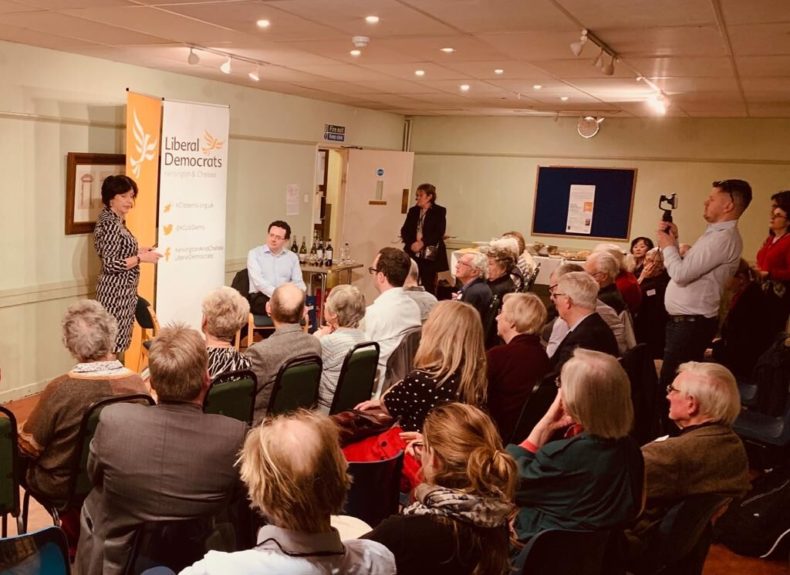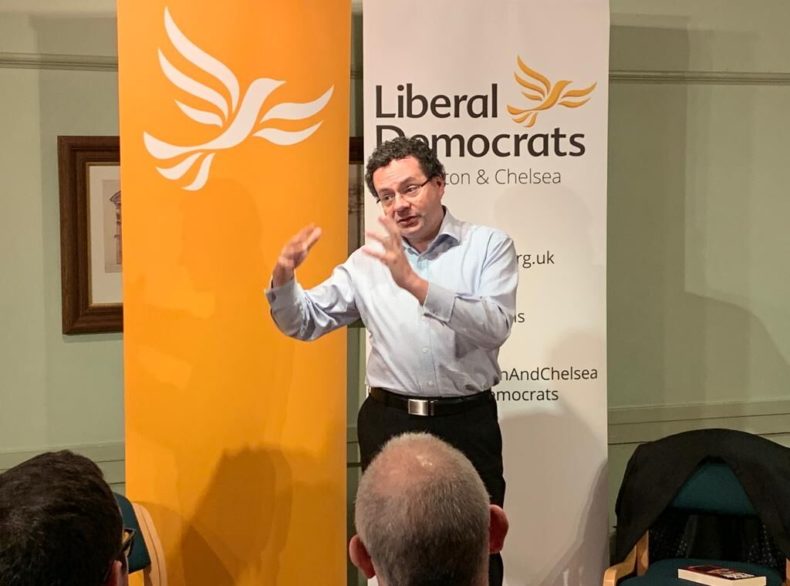How should the Liberal Democrats react to The Independent Group?

How should the Liberal Democrats react to the creation of The Independent Group and MPs leaving both Labour and the Conservatives? That was a major part of my talk this week at Kensington & Chelsea Liberal Democrats and kudos to the local party for organising the event so well.
It’s also the subject of the latest Liberal Democrat Newswire survey, which you can read about here.

Would you like me to come and do a similar talk with your local party or party body? Do get in touch.
UPDATE: You can now watch my talk here.
this whole episode is challenging the power and control of the party machine. At local level there are many Parish and Town councils where there is no party involvement and, in my experience, at District level, to get things done you need to work across party. The problems arise where there is control pressure exerted from outside the group to act in a particular way, and that power can be manipulated to the detriment of the area.
Bottom line for any elected person is that they represent the electorate, first and foremost, not the ‘golf club’ that they belong to. Too many members, especially Labour and Conservative ones, talk of the ‘party they represent’. Even one of TIG used the phrase, but at least their move away from the party structure will give others the courage to be independent, where no party fits with their own aims and principles.
Maybe this will be seen in this year’s local elections, with more independents standing.
Peter Tyzack makes very good points. The big questions are 1. Do we need the party system? 2. If not, how do we set it aside? and 3. What, if anything, might replace it?
The party system emerged some 200 years ago as a means of identifying and coordinating common (and often vested) interests among MPs in order to promote and control the oversight of the ruling factions. It could be argued that all political systems since ancient times have generated party systems – it is interesting to read Machiavelli in this respect (his book The Discourses, rather than The Prince). So although we might try to set the party system aside, we are unlikely to be successful. In within one-party states factions within the single ruling party have emerged to promote differing interests. This has happened in modern times in both the Russian Bolshevik and Chinese Communist systems, despite the efforts of autocratic leaders to stop it. It is likely that as long as there are vested interests in terms of power and personal gain, so there will emerge factions that seek to control the state in their own personal interests. Thus Guelphs and Ghibellines in mediaeval Italy, whilst in modern times more blatant attempts to promote personal gain are hidden behind a range of social and economic policies that purport to promote the wider public good.
So perhaps our main focus should be on question 3 – what can be done to introduce a party system that is more sympathetic to the broad interests and need of our modern pluralist society? It is unlikely that parties will reform themselves, but rather interests will become more vested. Perhaps the Tory ERG and Labour Momentum groups support this view. But cataclysmic events such as Brexit do throw up opportunities, and the emergence of the IG may be a symptom of that. If the overall outcome were to be a hung Parliament at the next GE, then we need to have plans in place to seize the moment. I suggest that the LibDems, the IG and possibly the Greens and any other centrist independents should come together to hammer out a joint policy and plan. The key aim is to avoid another coalition and instead to enter into confidence and supply agreements that are clearly dependent on time limited delivery of key reforms, such as PR and term limits. Placing a time limit on delivery, and not just having referenda, is supported by the experience of the LibDems in the last coalition.
I have gone on enough, and would be interested to see others’ views. But I would also be pleased to participate in any discussions that could lead to concrete change emerging.
The collaboration with TIG must be restricted in the short term to anti-Brexit campaigning both inside and outside Westminster. Until TIG have some recognisable principles and have formed a registered party further discussion about collaboration is premature. Besides Brexit the Liberal Democrats are organising for both local and European elections. It is unlikely that TIG will be in the position to organise campaigns for candidates in either of these. If TIG want to influence the election results they should come out and encourage voters to support LD candidates. Anything more formal in terms of co-operation must be predicated on TIG declaring they will support and campaign for proportional representation (which they have been silent on thus far). Having lived through the disaster of the SDP/Liberal Alliance years we must avoid the circumstances of the tail wagging the dog. They are the new kids on the block and should be treated as such.
Without a party system of some sort, democracy either becomes chaotic or a process of powerful leaders asking the supporters from time to time what they want (and choosing the questions carefully). In our case, local parties are the only democratic and devolved way of deciding things like who stands in elections and on what programme. Potentially a supporter scheme can attract in many people who otherwise would not have been involved and who would have been powerless except for their votes in external, public elections and for signing the odd petition. The devil is in the detail, though: such a scheme could also contrict the supply of new members as people who would have become members are happy with supporter status.
Our attitude to the TIG should be to seek to explore co-operation, both on policy and on at least the minimum electoral deal of us not standing against their MPs and them not standing against ours. If that goes well, we could look at more, but not a loss of our Liberal identity.
I suspect we’ll find the ground for co-operation is quite limited – common campaigns on Europe and a limited number of local agreements not to oppose one another (something that already happens a bit between us and Greens and real independents). I could be wrong and I favour finding out.
As for red lines – global warming and other environmental policy at least back to the coalition status, strong action against big boy tax avoidance and an end to local government being hit harder in the pocket than central or the private sector.
I am more than willing to listen to them, but and it’s a very big but, if they swop seats and try and take places like Richmond Park, then they should face the full strength of the Liberal Democrat electoral machine. Work with us as friends, work against us and face the consequences.
Liberals are general nice people and we try and be friendly with anyone who works for a positive society. However, we must stop being pushovers. The coalition demonstrated both behaviours. When the Tories listened the people benefited. However, rather too often we let them get way with terrible policies. We must toughen up and stand up to bad policies or over inflated ergos.